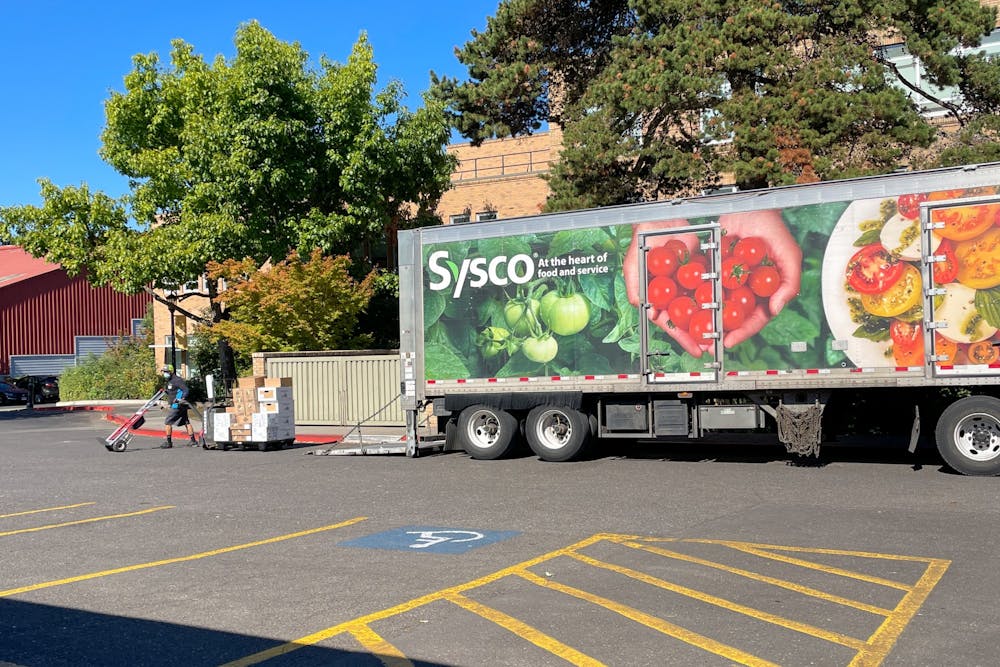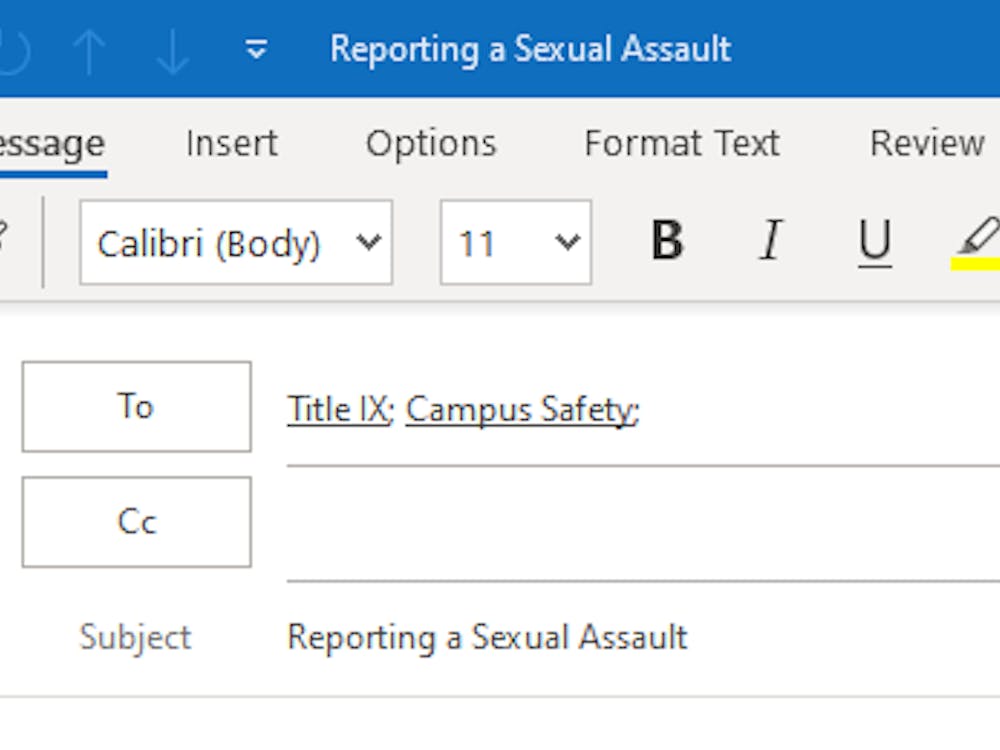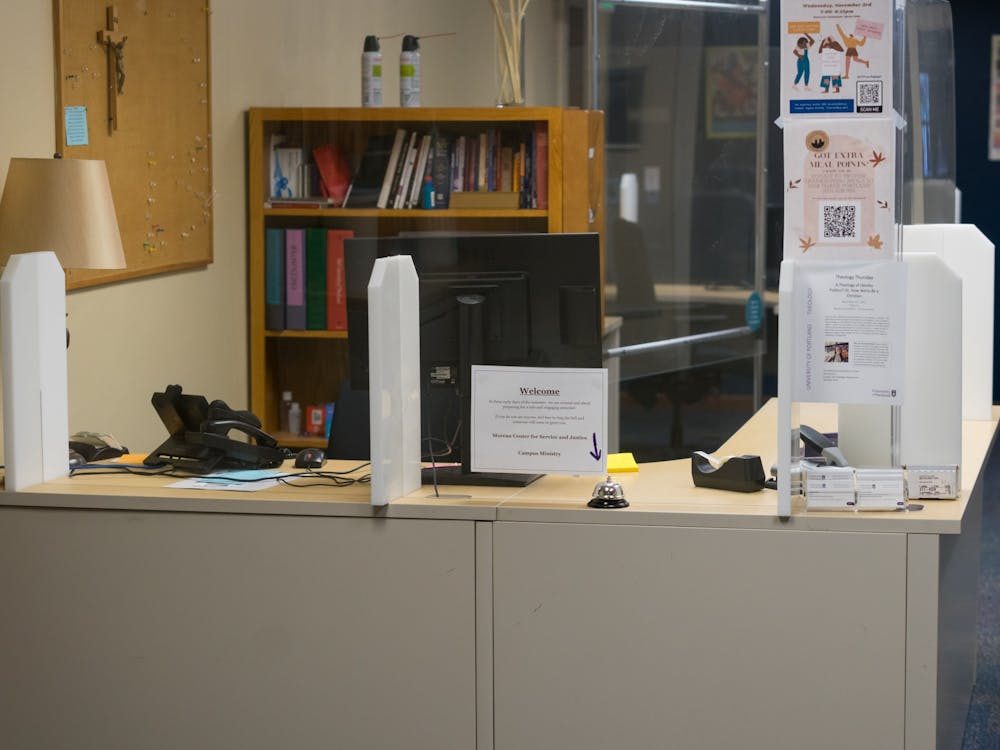Running a restaurant takes a village — managing employees, food shipments, food preparation, complaints and budgets is not easy, especially during a pandemic. Like many food service providers around the country, Bon App struggled this semester with hiring and retaining workers, unreliable delivery schedules, supply shortages and higher prices for everything.
At the same time, Bon App General Manager Kirk Mustain managed student complaints about food quality.
And in addition, Mustain occasionally stepped in as chef after longtime Bon App chef James Green left UP in September. It’s never been easy serving thousands of meals a week to hungry students, but this semester was particularly challenging.
Supply chain problems
UP’s food vendors have been experiencing supply shortages, like many other businesses in the U.S.
“The main products, they don’t have enough staff to pull the orders in the warehouse and pick them,” Mustain said. “And then they also don’t have enough truck drivers to deliver. So what we’re seeing happening is deliveries are getting either just canceled or subbed out or pushed to multiple days.”

Another problem that Mustain had was deliveries arriving when no one was at The Commons or the Pilot House to receive them. Mustain refers to this as “blind dropping.”
“Basically security lets a man in and nobody is here, and they just put it inside the building and leave with an open invoice,” Mustain said.
This has led to delayed cooking times because the cooks and other kitchen staff are spending the first part of the morning putting groceries away and managing inventories rather than starting the cooking process.
“So the first thing these poor guys have to do when they come in in the morning, six in the morning, we got to put groceries away because they can’t get to the walk-ins to do the job,” Mustain said. “And so now, you start the day behind.”
The shortages did not only affect schedules, but also items on the menu.
“What we’ve had to do to be successful is kind of narrow menus to the things we know we’re getting, because it’s worse to run out of something than to just be out of it,” Mustain said.
Staffing shortage
In addition to the food and supply chain shortages, there has also been a severe staffing shortage. Mustain is struggling with employee retention and some new hires quit soon after being brought on — or just don’t show up to work at all.
“Usually, what’s happening is like we’ll get one hired, and then one will quit,” Mustain said. “Maybe they find another job, or you get somebody to the onboarding process, and then they ghost you.”
Mustain tries to take care of his employees. He pays his workers a starting salary above minimum wage and offers a parking spot, shift meals and a uniform, as well as full benefits to full time staff.
It frustrates Mustain when people fill out paperwork and are ready to start the job and then they never show up for work. The lack of employees throughout the semester led to longer wait times and long lines, which bothered many UP students.
Student complaints
There were anonymous student complaints of uncooked food, hair in food and moldy food to an anonymous Instagram account with over 1,000 followers over the semester.
The account posted a photo of a pink burger, sparking anger in the comments. Mustain saw this post and said that when his employees were temping the burgers they came out to 165 degrees Fahrenheit.
“They are temping them and they’re jumping out at 165, which is 10 degrees more than the health department requires,” Mustain explained.
Mustain said that the burgers often look pink on the inside because of the density of the burgers.
“It can happen, it can be the density of the burger, it can be the fat to protein content, it can be a lot of things, but it does happen,” Mustain said. “It doesn’t mean the burger isn’t cooked.”
In response to concerns about pink meat, Mustain started using pre-made patties instead of having to scoop the ground beef and make their own. They also allow for more uniform cooking.
“There were some inabilities to get things right,” Mustain said. “In terms of company cooking temperatures, which I know you guys were talking about. It still meets the quality of the beef, but now they are pre patties.“
Mustain mentioned that although the meat is still safe to eat even if it is a little pink, people do not like that so Bon Appetit needed to find a solution so that people feel comfortable eating at The Commons or the Pilot House.

“Our solution is to basically cook a thinner burger and make them doubles,” Mustain said.
Mustain said that pre-made burgers have less oxygen in the burger patties helping to prevent any unnecessary bacteria growth.
Mustain worked throughout the semester to add variety to the menu, meeting with the Associated Students of the University of Portland (ASUP) Student Food Committee to work to add more options.
Although Mustain doesn’t respond to anonymous and second-hand complaints, he does want to hear from people directly.
“When somebody has a legitimate issue, and they contact me, I’ll either respond in writing, or I’ll sit down and have a conversation and talk about what the process is,” Mustain said.
Sophomore class Senators Lizzie Wisely and Miguel Navarro say Mustain truly cares about the service the UP community receives.
“Usually, people who had complaints with the food went to the UP food reviews page” Navarro said.
“(Kirk) can’t address the problem if it’s just hate,” Navarro continued. “He needs to hear from the person specifically about it.”
However, sophomore Gillian Ibarra had a different experience. She ordered a burrito bowl and remembers swallowing either a chicken bone or a piece of hardened cartilage.
“It was not a good day and it scratched my throat,” Ibarra said.
Ibarra complained via email to Bon App and she said she still has not received an email back.
Another student, sophomore Celeste Valentino, received a sandwich with moldy, gluten-free bread — her only negative experience with Bon App.
“I didn’t notice it had mold on it until I sat down,” Valentino said.
Valentino did not bring this to Bon App’s attention and instead just removed the moldy part of the bread.
In a case like that, Mustain said a student should report it to a Bon App employee immediately. He expects his staff to help problem solve, just as he does.
Wisely had a positive outcome when she approached a Bon App manager about needing a food allergy accommodation.
When approaching a Bon App manager about a food allergy accommodation, Wisely said her experience was a good one.
“They were so accommodating and so sweet,” Wisely said. “They took my number down. They replaced what I got. The manager also added more meal points onto Wisely’s account to make up for the mistake.”
That’s the way it should work when people have complaints, according to Mustain, who has worked for Bon App at UP for 25 years. He wants the UP community to know that he and his staff are doing their best with the challenges they face.
“Everybody’s working hard. They care a lot about what they’re doing.”
“I want all of our customers to feel free to give us input,” Mustain said. “You know, positive, negative. Positive would be better but negative is essential otherwise we don’t know when people aren’t happy.”
Isabel Cornejo is a reporter for The Beacon. She can be reached at cornejoi22@up.edu.








